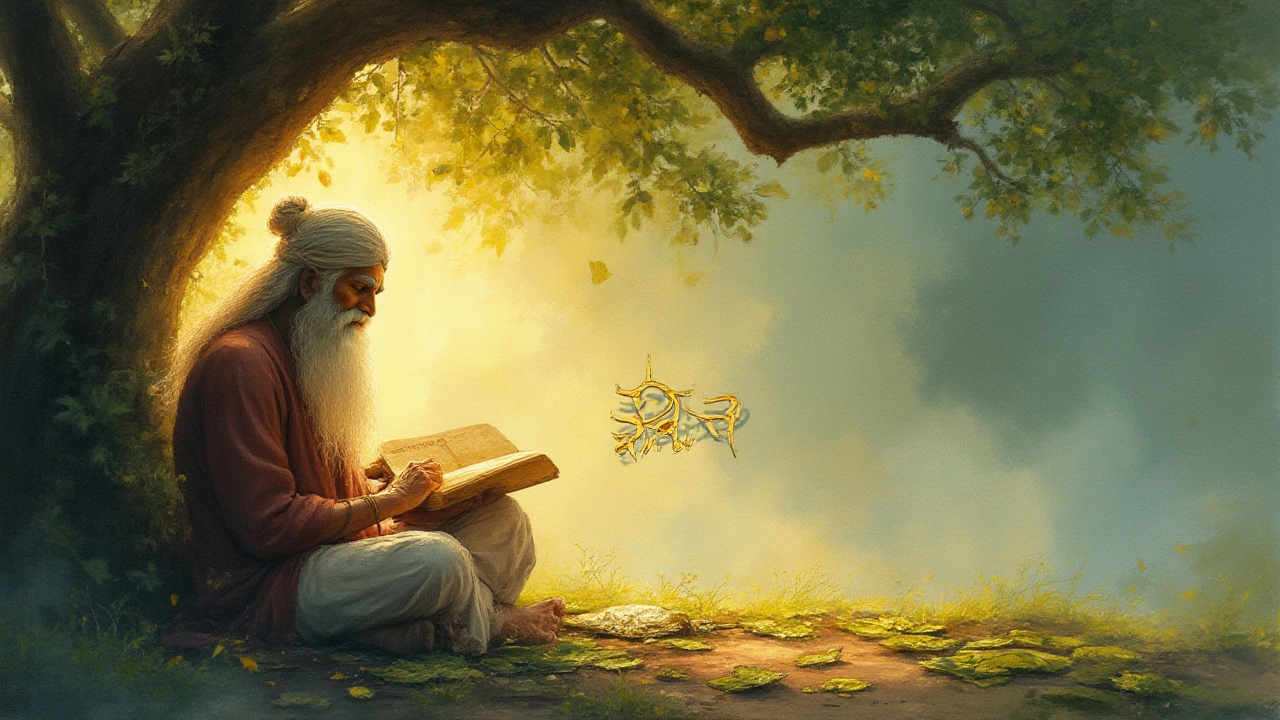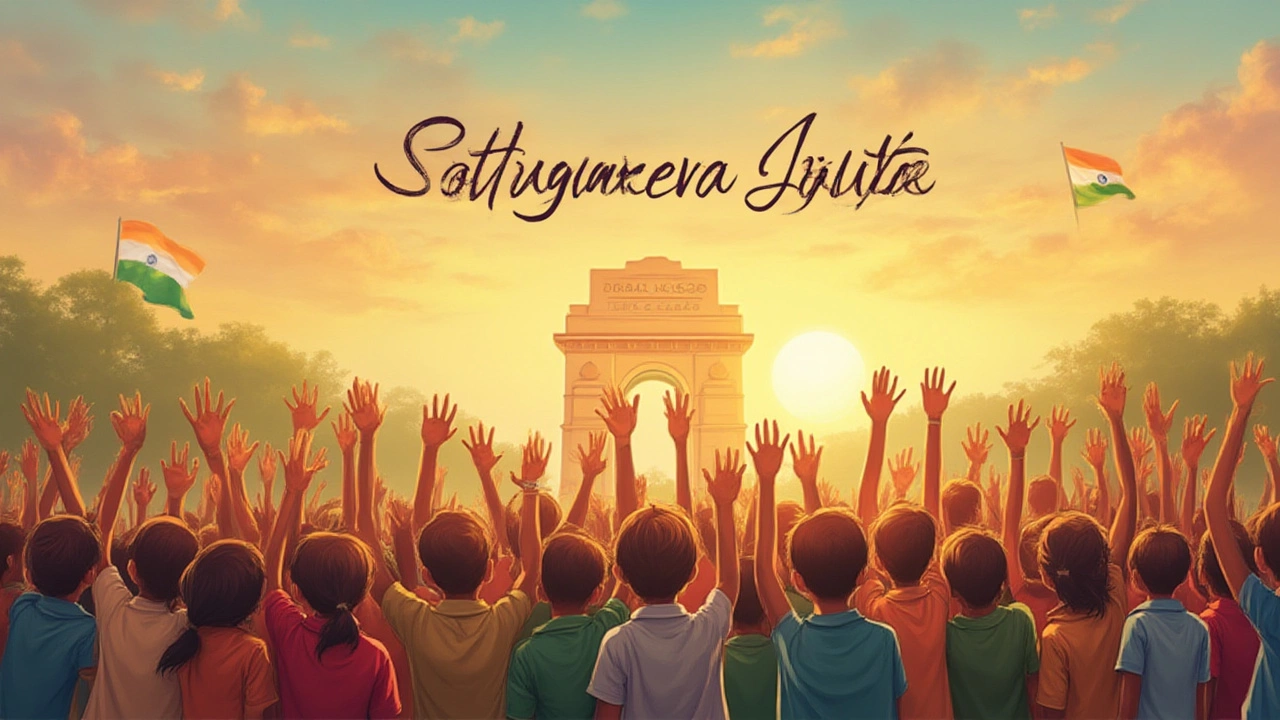If you’ve ever seen the Lion Capital of Ashoka on Indian coins or government documents, you’ve also noticed a short line underneath: “Satyameva Jayate.” Just three words, but they carry the weight of centuries and the heartbeat of a billion people. The motto of India isn’t just ink on paper—it’s built into the Indian psyche, woven into the culture, echoed on the lips of freedom fighters, and etched across monuments. But what does “Satyameva Jayate” actually mean? Why was it chosen, and does it influence Indian life today, or has it become just another government slogan?
Tracing the Roots: The Birth and Meaning of India's Motto
India’s national motto, Satyameva Jayate, isn’t simply a catchy phrase—it's ancient, loaded with history, and still very much alive in the Indian imagination. The words aren’t in Hindi, English, or Sanskrit’s cousin languages; they’re pure Sanskrit, which has been around since the Vedic era. “Satyameva Jayate” literally means “Truth alone triumphs.” That’s a bold statement, right? And it’s not some modern creation cooked up at the last minute. It actually comes from the Mundaka Upanishad, a sacred Hindu text believed to have been compiled over 2,500 years ago. The full verse goes: “Satyameva Jayate nanritam, satyena panthā vitato devayānah,” which translates to: “Truth alone prevails, not falsehood. Through truth, the divine path is spread out.”
So why did the framers of independent India, in those tense, hopeful days of 1947, settle on these words? It wasn’t just about paying homage to the past; it was a conscious decision to emphasize values that would form the backbone of the new nation—a country about to be born out of decades of colonial rule, violence, and sacrifice. Jawaharlal Nehru, India’s first Prime Minister, and other leaders saw truth as a rallying cry in a world where truth was regularly twisted, whether by colonizers or by the chaos of Partition. By inscribing “Satyameva Jayate” beneath the Lion Capital—a national symbol that itself came from Emperor Ashoka’s days—they anchored the idea that a modern India would seek justice and fairness, with truth as its strongest weapon.
But here’s a little insider trivia: it wasn’t on the first few drafts of the national emblem. The phrase gained momentum thanks to people like Rajendra Prasad, India’s first President, who championed its inclusion. On January 26, 1950, when India became a republic, “Satyameva Jayate” was officially adopted. If you want proof that these three words matter, just look at modern Indian currency—every rupee has them. You’ll see them on national awards, government buildings, and, more dramatically, in courtrooms, where judges and lawyers swear by truth before all else.
The global connection goes deeper. While ancient Greece talked about “truth outlasting all,” India wasn’t alone in cherishing this value. But adopting “truth alone triumphs” as India’s motto set a challenge for every citizen, from politicians to street vendors: Can you live by truth in a country as complex as this?
Satyameva Jayate is not just a national emblem. It is a call to each one of us to pursue integrity, honesty, and courage in public life. — Dr. APJ Abdul Kalam
Lots of people can quote this motto, but few know that it continues to be used in official language and literature, way beyond what government rules require. It’s become part of political speeches, school pledges, and even Bollywood scripts. Sometimes it’s quoted seriously, sometimes more cynically, but it always starts a conversation about what truth really means in contemporary India. The words, rooted in Upanishadic ideals, have stretched across millennia and survived countless power shifts, making India’s motto a living bridge between past, present, and future.

From Ancient Wisdom to National Identity: Satyameva Jayate in Daily Life
It’s easy to dismiss mottos as nice words, but “Satyameva Jayate” has a strange afterlife, way beyond government buildings. It pops up in Indian pop culture, at dinner tables, in political protests, and even as hashtags on social media. How many national mottos have actually become the name of a hit TV show? In 2012, actor Aamir Khan hosted “Satyamev Jayate,” a program tackling taboo and tough issues—dowry, corruption, discrimination—and suddenly a new generation was asking what role “truth” could play in society. The motto was part of the show’s heartbeat, not just its name.
You can also hear “Satyameva Jayate” in Indian courtrooms, where the phrase is more than symbolic. In fact, under India’s legal system, witnesses swear to “speak the truth, the whole truth, and nothing but the truth”—a pledge that echoes the national motto. Judges and lawyers sometimes refer to the phrase when giving verdicts or arguing cases involving integrity, fraud, or justice. Educational institutions often print the motto on their letterheads, include it in morning assemblies, or set it up as murals or engravings on campus gates. Kids learn about it as part of their civics lessons and social studies textbooks.
Still, for all its prominence, the motto isn’t without challenges. In a country as diverse—linguistically, culturally, and politically—as India, the meaning of “truth” itself can get complicated. Political parties sometimes invoke Satyameva Jayate in their campaigns, but critics call them out when actions don’t match the ideal. It’s a reminder that upholding truth is easy to say but tough to do, especially when fake news and misinformation spread quickly online. Debates about press freedom, judicial honesty, or corruption regularly turn back to whether anyone is living up to the promise of “truth alone triumphs.”
Let’s talk about the street view, not just the official face. Every Independence Day and Republic Day, school kids write essays or perform plays themed around Satyameva Jayate. People paint the motto onto cars and rickshaws, artists use it in street art and posters, and protestors—whether for women’s rights or environmental causes—shout it on hand-painted banners. A quick YouTube search for the phrase brings up everything from government documentaries to stand-up comedy sketches poking fun at its use in political advertising. The internet is full of memes that play with the idea: Does truth really win in every Indian election, cricket match, or love story? Clearly, the motto has legs beyond the original vision.
Curious about how the motto is lived out in tough situations? Here’s a true story from the 2012 Delhi gang rape case. The protests that swept across Delhi and other Indian cities at the time saw thousands carrying placards reading “Satyameva Jayate,” demanding justice and truth in the face of official denial, slow police work, and bureaucratic inertia. The phrase, stripped of its formality, became a battle cry for ordinary Indians demanding a fair investigation and a safer society. Whenever India faces a crisis—whether a corruption scandal or a natural disaster—the motto becomes a reminder of the nation’s deeper values, even if imperfectly followed.
In spiritual terms, “satya” (truth) and “jayate” (triumphs) are more than just dictionary meanings. The Upanishads teach that truth is divine, the foundation for both personal growth and collective progress. For many, using “Satyameva Jayate” is a daily reminder to check small dishonesties and strive for bigger ideals, even if only in personal life. Some Indian parents invoke the phrase when counseling their kids about honesty in exams, friendships, or work. You find versions of the motto painted on police stations, NGOs, even cricket club trophies—anywhere someone is trying to say, “Let’s do this right.”

Why Satyameva Jayate Still Matters: Lessons and Challenges for Modern India
Fast forward to 2025, and you’ll notice something: “Satyameva Jayate” hasn’t faded away into irrelevance. The phrase is as visible, and sometimes as debated, as ever. In an age when truth can feel slippery—when viral videos, deepfakes, and WhatsApp forwards spread rumors at light speed—the motto gets tested every single day. As digital life takes over, the idea that “truth alone triumphs” is both a bold aspiration and a daily struggle. India might be a digital powerhouse, with tech leaders in Silicon Valley and homegrown start-ups everywhere, but truth is still a work in progress, not a finished line.
Recent court judgments—like the 2023 Supreme Court order on free speech and fake news—often cite “Satyameva Jayate” to frame the debate about what values India should hold onto in the internet era. In schools and colleges, young adults challenge old ideas, asking whether the phrase means only legal truth or also moral, emotional, or scientific truth. Social campaigns against corruption, environmental damage, child marriage, or gender discrimination frequently hold “Satyameva Jayate” up as a standard, even when frustrated by how far reality can drift from the ideal.
If you look closely, the motto is being rebooted for the modern world. NGOs, activists, and even businesses embrace the phrase—sometimes sincerely, sometimes to look good—but either way, it keeps truth in public conversation. Some social media influencers add it to their bios as a sign of credibility, while others use it to call out the powerful. The phrase gets printed on wedding invitations, motivational posters, smartphone screensavers, and even gym T-shirts.
Here’s a thought: every society has to decide what it values enough to put on the national emblem. India chose “Satyameva Jayate”—truth, not just power or prosperity—as its badge. That’s a hard path, but it’s a defiant one, especially in a world where truth is up for grabs. Who gets to define truth? Is it always ethical truth, legal fact, or something more personal? In India, these debates are lived out every day in courts, newsrooms, classrooms, and family WhatsApp groups. The motto isn’t always obeyed, but it’s almost always discussed.
Here are a few ways to bring the motto out of the textbooks and into everyday Indian life:
- Challenge fake news and rumor-mongering by double-checking sources before sharing.
- Encourage schools to blend lessons about “Satyameva Jayate” with real-life examples of courage and honesty.
- Push politicians and public servants to explain their decisions in the light of the national motto.
- Support media houses that stick to verified facts, not clickbait.
- Start dinner-table conversations about what truth means in family life, business, or friendship.
Even if every Indian doesn’t live up to the motto every minute—and who does, really?—the words are a challenge, not a checklist. “Satyameva Jayate” is less about the perfect past and more about the journey: a daily, sometimes messy, attempt to make truth matter, even when it’s hard. If you want to understand India, ask how it manages to hang onto this motto against all odds. That’s where the real story lives.
